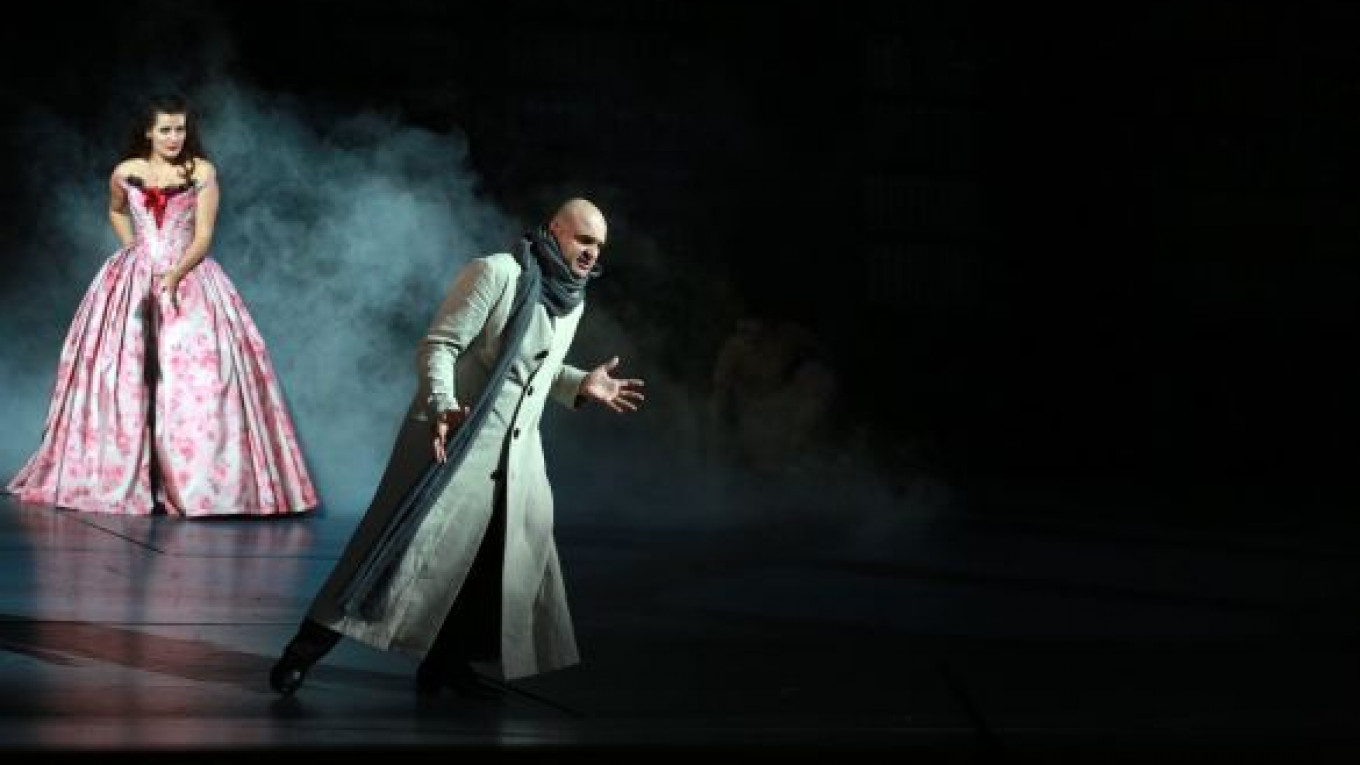Celebrating this year's 200th anniversary of the birth of German composer Richard Wagner, opera houses throughout the world are marking the occasion by mounting new productions and reviving older ones of his operatic legacy.
Moscow opera houses are no exception. Later this month, the Bolshoi Theater brings back its eccentric, but engaging 2004 version of Wagner's "The Flying Dutchman," while last spring the Novaya Opera unveiled a masterful production of his "Tristan and Isolde," in the first-ever staging by a Moscow theater. Helikon Opera, in a true flight of fancy by its artistic director, Dmitry Bertman, reduced his 14-hour-long "The Ring of the Nibelung" cycle to a single evening of excerpts, sung and acted out on board a modern airliner.
Last weekend, the Stanislavsky and Nemrovich-Danchenko Musical Theater joined the celebrations with a new production of Wagner's "Tannhäuser." Although it enjoyed great popularity in Moscow prior to the Bolshevik Revolution, "Tannhäuser" seems not to have been staged here by a local company since the Bolshoi's production of 1919.
"Tannhäuser" had its premiere in Dresden in 1845. Its libretto, by Wagner himself, was drawn from both German mythology and German history and essentially depicts the struggle between profane and sacred love — represented, respectively, by Venus, the goddess of love, and Elizabeth, the chaste niece of Landgraf Herrmann, ruler of the German province of Thuringia? — and eventual redemption through the power of the latter.
The Stanislavsky's production of "Tannhäuser" has much to commend it, but also a number of serious defects — all of which, over time, the theater can probably cure.
Chief among the virtues was the staging by Latvian director Andrijs Zagars, which quite convincingly moved the action from the 13th century to the time of the opera's composition and played it out in splendidly straightforward fashion.
Andris Freiburgs provided a fine series of sets, especially the huge winter garden of Venus' mountain realm and the haunting depictions of the Thuringian forest, while Kristine Pasternaka clad principals and chorus in handsome mid-19th-century dress.
Among the cast that I heard at the second performance, mezzo-soprano Larisa Andreyeva, as Venus, baritone Alexei Shishlyayev, as Wolfram, and bass Dmitry Ulyanov, as Hermann, all acted and sang their roles superbly and displayed surprisingly precise German diction. ?
An odd feature of the production was the use of a French text, rather than the original German, in the opening scene. In 1861, at the invitation of Emperor Napoleon III, Wagner brought "Tannhäuser" to Paris. For the occasion, the composer made numerous revisions to the score, especially in the opening scene, to which he added a ballet — as was then obligatory at the Paris Opera — and his libretto was translated into French. Zagars' harking back to that production at first seemed jarring, but in the end proved very effective.
Among the disappointments was the ballet created by Moldovan choreographer Radu Poklitaru, already well-known to Moscow dance audiences, particularly for his powerful modern-dress staging of Sergei Prokofiev's ballet "Romeo and Juliet" at the Bolshoi in 2003. His contribution to "Tannhäuser," with dancers from the Ballet Moskva troupe, seemed more like a teenage romp than the erotic bacchanal to be expected in the presence of Venus.
Disappointment was also to be found in the performances of the opera's two principal roles. Anna Nechayeva, from the Bolshoi, sang quite beautifully in the quieter passages of Elizabeth's music. But when called upon to deliver power, her voice became strident and plagued by vibrato.
The role of Tannhäuser is one of the most difficult to cast in all of opera, calling for a tenor with plenty of heft to his voice, ringing high notes and a considerable degree of vocal flexibility. Valery Mikitsky struggled valiantly with the music, but unfortunately lacked all of the role's necessary vocal requirements.
Most disappointing of all, however, was the conducting of Frenchman Fabrice Bollon, currently musical director of the opera house in Freiburg, Germany. All too often he seemed insensitive to the score, resorting to bombastic fortissimos and to tempos that either dragged or seemed too swift.
The Stanislavsky has been blessed with a superb physical production of "Tannhäuser" and has at least a number of singers who can do the music justice. If it can find an adequate tenor for the title role, which probably means searching abroad; the right kind of Elizabeth, though I have heard reports that it may already have one in soprano Natalya Muradymova, who sang in the first cast; and a conductor with the insight and stylishness that Jan Latham-Koenig applies to Wagner's "Lohengrin" and "Tristan and Isolde" at the Novaya Opera, then it is likely to have for itself one of the real gems of opera to be found on the Moscow stage.
"Tannhäuser" (Tangeyzer) plays Nov. 12 and 14 at 6:30 p.m. at the Stanislavsky and Nemirovich-Danchenko Musical Theater, 17 Bolshshaya Dmitrovka. Metro Chekhovskaya. 8-495-723-7325. stanmus.ru.
Contact the author at [email protected]
Related articles:
A Message from The Moscow Times:
Dear readers,
We are facing unprecedented challenges. Russia's Prosecutor General's Office has designated The Moscow Times as an "undesirable" organization, criminalizing our work and putting our staff at risk of prosecution. This follows our earlier unjust labeling as a "foreign agent."
These actions are direct attempts to silence independent journalism in Russia. The authorities claim our work "discredits the decisions of the Russian leadership." We see things differently: we strive to provide accurate, unbiased reporting on Russia.
We, the journalists of The Moscow Times, refuse to be silenced. But to continue our work, we need your help.
Your support, no matter how small, makes a world of difference. If you can, please support us monthly starting from just $2. It's quick to set up, and every contribution makes a significant impact.
By supporting The Moscow Times, you're defending open, independent journalism in the face of repression. Thank you for standing with us.
Remind me later.


